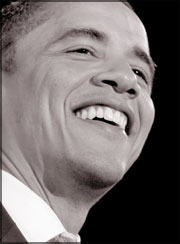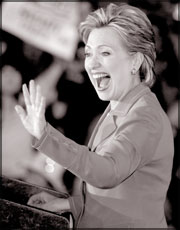Clinton fights on as focus turns to superdelegates
Despite an overwhelming defeat in North Carolina and a narrow victory
in Indiana, Sen. Hillary vowed to stay in the race until her party has a
nominee.
"I, obviously, am going to work as hard as I can to become that
nominee. That is what I've done; that's what I'm continuing to do," she
said Wednesday in Shepherdstown, West Virginia.
The focus of the Democratic race now turns to the superdelegates,
because they outnumber the remaining pledged delegates.
Neither Sen. Barack Obama nor Clinton is expected to win the 2,025
delegates needed to capture the nomination during the remaining
contests. That means the superdelegates -- party and elected officials
who are allowed to vote during the national convention -- will probably
decide who becomes the nominee.

Obama is ahead of Clinton in total delegates: 1,842 to 1,686. Watch
how the numbers work against Clinton »
Clinton narrowly leads Obama in superdelegates who have publicized
whom they are voting for. But the superdelegates are beginning to head
to Obama's corner, said David Gergen, a CNN political analyst.
"The superdelegates are starting to move. The dam is breaking,"
Gergen said. "No matter what happens in these primaries, it's much less
important than the fact that the superdelegates are starting to swing
his way, and that, in turn, will try to put pressure on her."
Obama's campaign announced four new superdelegates for the Illinois
senator on Wednesday, compared with one coming out for Clinton.
Only 217 pledged delegates are up for grabs in the remaining six
contests: West Virginia, Kentucky, Oregon, Puerto Rico, Montana and
South Dakota.
Sen. George McGovern tells Larry King why he's switching his support.
Tonight, 9 p.m. ET
Obama chief strategist David Axelrod said that during the six
contests remaining, his candidate and Clinton will "probably end up
roughly splitting the remaining delegates."
"There's more superdelegates uncommitted right now than there are
remaining pledged delegates," Axelrod noted. "We feel by May 20, we will
have secured a majority of the delegates. So, I think we're in a very
strong position here."

Clinton met with Democratic Party officials on Wednesday and
undecided members of Congress on Tuesday afternoon to make her case for
the nomination and press for a resolution to seating the delegations of
Florida and Michigan.
Meanwhile, House Speaker Nancy Pelosi said the race was not over. She
has repeatedly said she remains neutral in the Democrats' nomination
battle but said Clinton's slim margin of victory in Indiana doesn't mean
her campaign was finished.
"A win is a win. Let's just call it what it is," Pelosi said, adding
that a protracted Democratic fight for the nomination isn't going to
hurt the party.
"I believe the races must continue," she said. "The people should all
have the opportunity to speak as long as two candidates wish to compete
in those primaries and caucuses. In a few weeks, we will be on our way
to nominating the next president of the United States."
Clinton needs to convince superdelegates that she'd be a better
matchup against Sen. John McCain, the presumptive GOP nominee. Watch
Clinton vow to fight on »
"I believe that I'm the stronger candidate against Sen. McCain, and I
believe I would be the best president among the three of us running. So,
we will continue to contest these elections and move forward," she said
Wednesday.
Sen. Dianne Feinstein, a key supporter of Clinton's White House bid,
said Wednesday that the drawn-out race for the Democratic presidential
nomination is producing "negative dividends in terms of strife within
the party."
Feinstein, D-California, said she wants to talk to Clinton to "see
what her view is on the rest of the race, what the strategy is."
Obama pulled out a 14-point win in North Carolina on Tuesday, and
Clinton barely took Indiana, winning by 2 points.
Tuesday was Clinton's last major opportunity to significantly cut
into Obama's lead in the delegate count.
The 187 delegates at stake were awarded proportionally, meaning Obama
padded his lead while Clinton slipped further behind.
In Obama's speech Tuesday night, he looked ahead to the general
election, mentioning Clinton only to congratulate her on Indiana and
avoiding all talk of recent campaign controversies.
- CNN
Obama gains momentum
With Barack Obama's lead widening in the fight for the Democratic
Party nomination for the 2008 U.S. presidential election, Hillary Rodham
Clinton's bid appears to be weakening by the day.
The narrow win by Ms Clinton of the Indiana primary even as she lost
resoundingly to Mr. Obama in North Carolina on May 6 has failed to
deliver the decisive turnaround in momentum that she needed to surge
within touching distance of the front-runner.
The large turnout of Afri can-Americans in North Carolina ensured
that the first of their ethnicity with a realistic shot at the White
House carried the state with a 14 percentage point lead. Mr. Obama has
once again widened the popular vote gap that Ms Clinton had narrowed
earlier through victories in the Ohio and Pennsylvania primaries.
The Illinois Senator should be able to pick up the bulk of the 187
pledged delegates at stake in the May 6 primaries.
Ms Clinton had clearly miscalculated that her wins in the big swing
States would persuade the super-delegates — party office-bearers and
those elected on its ticket — to line up behind her. While she still
retains a slim lead in the super-delegate count, the drift over the past
fortnight has been in favour of her opponent.
With the remaining six nominating contests expected to be split
evenly, it is unlikely that either candidate will garner the support of
the 2,025 delegates needed to clinch the nomination by the end of the
primary season.
The nomination will eventually be decided by the 270 super-delegates
who remain uncommitted. The main argument with which Ms Clinton has been
trying to convince the fence-sitters in the Democratic Party is that she
is likely to be more effective in taking on the Republican nominee in
the November election.
But this argument appears to have cut less ice with the Democratic
delegates, more of whom are moving to Mr. Obama. The Clinton campaign is
also trying to convince the party's Rules and Byelaws Committee to allow
the participation in the Denver convention of the 366 delegates who have
been notionally selected by voters in Florida and Michigan.
Ms Clinton hopes that a rule change will help her gain a small lead
in the delegate count and substantially narrow the popular vote margin.
Such an outcome, she believes, will induce the super-delegates to
rethink their options.
But the fact that the Obama-Clinton contest still remains unresolved,
giving the Democratic Party very little lead time to have its
presidential nominee launch an effective campaign against the Republican
opponent this November, does not bode well for the party's prospects.
- The Hindu
|
